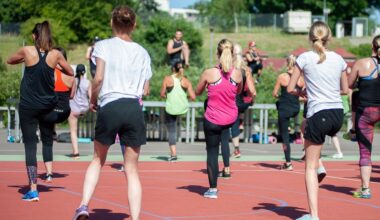The Role of Rest and Sleep in Muscle Recovery and Growth
In the realm of resistance training, one of the key components for optimal results involves understanding the importance of both rest and sleep. Resistance training, primarily focused on muscle hypertrophy, can place immense stress on the body. This stress is necessary for muscle growth, yet what often goes overlooked is the role of recovery. Muscle fibers undergo significant damage during intense workouts, and substantial recovery time is essential for those fibers to rebuild stronger than before. Without adequate rest, the risk of overtraining rises, leading to fatigue and diminished performance. Recovery also helps to reduce muscle soreness and improve overall strength. In an age where many prioritize workout frequency and intensity, it’s crucial to remember that growth occurs not during the workout but in recovery periods. Therefore, implementing comprehensive recovery strategies, including both sleep and active rest days, can significantly optimize training outcomes. Integrating rest days allows time for muscle repair and growth while maintaining workout quality over time. Consequently, balance in training and recovery can provide the ultimate formula for achieving fitness goals efficiently and effectively.
Furthermore, sleep plays a massive role in muscle recovery and overall health. During deep sleep stages, the body undertakes critical repair functions. Hormones such as testosterone and growth hormone surge during sleep, both of which facilitate muscle growth and recovery. Insufficient sleep leads to a reduction in these vital hormones, limiting muscle development and increasing the risk of injury. Moreover, sleep affects cognitive function, impacting workout concentration and motivation. Athletes and fitness enthusiasts alike should aim for seven to nine hours of quality sleep each night to create ideal recovery conditions. Establishing a consistent sleep schedule enhances overall sleep quality. Implementing relaxation techniques before bedtime can also contribute to improved sleep onset and duration. Additionally, creating a comfortable sleep environment, as well as limiting screen time before bed, aids in achieving restful sleep. Essential nutrients like magnesium and calcium promote muscle relaxation, enhancing recovery during sleep. Therefore, prioritizing sleep alongside workout routines is vital for muscle recovery. It is not merely a period of inactivity but a crucial phase in achieving desired fitness outcomes and enhancing athletic performance.
The Science Behind Muscle Recovery
The physiological processes associated with muscle recovery are sophisticated and multifaceted. When engaging in resistance training, microtears occur within the muscle fibers, triggering a series of cellular responses aimed at repair. Satellite cells, special muscle stem cells, become activated post-exercise, contributing to muscle growth by donating nuclei to the damaged fibers. This process, known as hypertrophy, is greatly influenced by both rest and adequate nutrient intake. In addition to physical recovery, psychological aspects such as stress and motivation play essential roles in overall recovery. Chronic stress can impair recovery, highlighting the importance of a balanced lifestyle. Research suggests using active recovery methods, such as low-intensity cardio or yoga, can enhance post-workout recovery. These approaches improve blood circulation and nutrient delivery to sore muscles, thereby assisting in reducing muscle stiffness. Furthermore, proper hydration is crucial, as fluids aid in flushing out toxins produced during intense exercise. Ultimately, understanding these mechanisms allows individuals to design well-rounded training programs focused on maximizing recovery potential, ultimately leading to better performance and enhanced results.
In addition to physical methods, nutrition plays a crucial role in muscle recovery. Consuming protein post-workout is essential, as it provides the amino acids necessary for repairing microtears in muscle fibers. A 20-30 gram serving of high-quality protein, such as lean meats, dairy, or plant-based sources, can be effective in facilitating recovery. Pairing protein with carbohydrates aids in replenishing glycogen stores, which are depleted after resistance training. Foods such as fruits, whole grains, and recovery drinks are excellent sources for carbohydrate replenishment. Fat has also been implicated in recovery, particularly omega-3 fatty acids, known for their anti-inflammatory properties. Incorporating a recovery snack or meal within 30 minutes post-workout can significantly enhance recovery. Moreover, maintaining a balanced diet over time promotes optimal body function and supports muscle growth. It is equally important to adjust caloric intake according to the intensity of training, ensuring the body has adequate energy to recover while also promoting muscle gains. The right nutritional strategies can complement recovery processes and lead to substantial improvements in training effectiveness.
Importance of Active Recovery
Another vital element of muscle recovery is the concept of active recovery. Engaging in low-intensity activities on rest days can facilitate blood flow, helping to deliver essential nutrients to the muscles while decreasing lactic acid build-up. Activities such as walking, cycling, or swimming can provide effective active recovery, giving the body an opportunity to recover without complete rest. This contrasts well with passive recovery, where the body is entirely at rest. While passive recovery can sometimes be beneficial, active recovery is often recommended in sports and resistance training communities due to its numerous physiological benefits. Increased blood flow during low-intensity exercise promotes quicker healing and adaptation. Moreover, the psychological aspect of active recovery can combat boredom and make it easier to maintain an exercise routine. Additionally, yoga and stretching can enhance flexibility, contributing to overall injury prevention. Integrating active recovery strategies into a training program can enhance overall performance, reduce fatigue, and contribute to longevity in any fitness journey, thus supporting sustainable progress toward achieving personal fitness goals.
It is essential to recognize that individual needs for rest and recovery vary significantly among athletes and fitness enthusiasts. The volume, intensity, and frequency of training substantially influence recovery demands. Some may thrive with more frequent training, whereas others may require longer periods of rest between workouts. Factors such as age, genetics, and training experience also play crucial roles in determining appropriate recovery needs. For instance, older athletes may find that they need more recovery time due to slower physiological processes. Through careful self-assessment, individuals can identify their unique recovery needs. Monitoring signs of fatigue, soreness, and performance levels can offer valuable insights. Adjusting training frequency, length, and intensity will maximize training effectiveness while preventing injury. For optimizing muscle recovery, incorporating feedback from one’s physical condition can enhance performance and individual growth. Additionally, listening to the body’s signals is vital for spotting early signs of overtraining, enabling timely intervention and adjustments. Ultimately, by personalizing recovery strategies, athletes can enhance their resilience and lead longer, more productive fitness journeys.
Conclusion
In conclusion, understanding the role of rest and sleep in muscle recovery and growth is indispensable for anyone engaged in resistance training. Implementing strategic rest periods, prioritizing quality sleep, and optimizing nutrition are fundamental to achieving desired results. Integrating active recovery while remaining attentive to individualized recovery needs allows athletes and fitness enthusiasts to develop comprehensive training programs tailored to their specific goals. Rather than viewing rest as an inconvenience, embracing it as an integral part of the training process can significantly improve performance and facilitate long-term benefits. Balancing high-intensity workouts with proper recovery methods will support muscle growth and enhance overall health. The intersection of adequate rest, quality sleep, and informed nutritional choices will ultimately determine success in any resistance training regimen. Consequently, investing time into recovery should be viewed as equally important as the workouts themselves. This holistic approach will pave the way for reaching peak performance and sustaining fitness levels over time. In the competitive world of fitness, a well-rested body stands to outperform one overly fatigued, setting a powerful tone for future success.
Moreover, understanding the significance of both rest and sleep contributes to not only muscle recovery but also mental well-being and overall fitness. When strategically planned, adequate rest periods can enhance motivation and mental clarity during workouts. A well-rested mind can focus better, making it easier to reach training targets. Thus, the relationship between physical and mental recovery is reciprocal, where a strong body fuels a strong mind and vice versa. Furthermore, incorporating relaxation techniques and mindfulness practices can further heighten recovery effects. This comprehensive understanding aids athletes, coaches, and fitness enthusiasts in optimizing training schedules. Time spent on recovery should never be undervalued in the pursuit of excellence. As individuals increase their knowledge of recovery mechanisms, they can make more informed decisions about training and progression, leading to more significant achievements within their fitness endeavors. Ultimately, the balance between high-intensity training and adequate recovery is essential for consistent progress. By acknowledging and prioritizing this balance, individuals can unlock their potential and maintain their dedication to achieving long-term physical and mental health.





